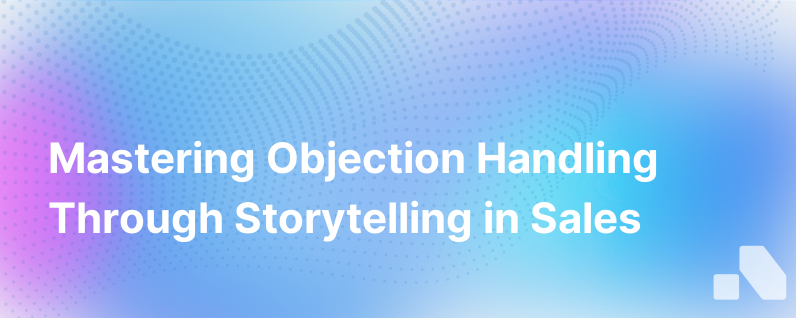Overcoming Sales Objections Storytelling
Published on October 4, 2023 by Sawyer Middeleer
No matter what you are selling, objections will come up in the sales process. Whether customers are not yet convinced of the value of your product, fear change, or are uncertain about the price, it's up to sales teams to navigate these obstacles to create a compelling reason to buy. It requires adept storytelling to overcome these hurdles, shaping the narrative to address objections and ease doubts. This article will cover how using storytelling techniques can enhance your ability to overcome common sales objections.
The Power of Storytelling in Sales
Storytelling is undoubtedly one of the most powerful tools in a salesperson's arsenal. A compelling story can evoke emotion, create connection, and shape perspective. It's a potent enchantment that can influence buying decisions.
Why is storytelling so powerful? Science has the answer. Stories activate parts of the brain that pure facts cannot, stimulating the sensory and motor cortexes leading to deeper emotional engagement. More so, successful stories are often based on conflict resolution, and that concept aligns perfectly with the art of overcoming sales objections.
Recognizing common sales objections
Before crafting your story, it's critical you understand the nature of the objections at hand. Common sales objections generally fall under four major categories:
- Value objections: Prospects don't see the value in your offering or have a clear understanding of it.
- Price objections: Prospects believe your product is too expensive or doesn't justify the cost.
- Need objections: Prospects don't think they need your product, or believe that their current solutions are sufficient.
- Trust objections: Prospects are not convinced about the authenticity or reliability of your product or your brand.
Crafting a Narrative to Overcome Objections
Stories can tactically address each of these objections in a relatable and empathetic way, sending a persuasive message to your buyer.
Value Objections
For prospects who struggle to grasp the value of your offering, case study stories can be effective. A well-crafted case study story would narrate how similar businesses in their industry have benefited from your product, emphasizing metrics and results. The narrative should give your prospect a clear picture of the benefits others in a similar position have derived, illustrating the potential value to their business.
Price Objections
Addressing price objections can be tricky, but the right story can help the prospect see beyond the price and focus on the value. Crafting a story that zeroes in on the long-term value, growth, and ROI from using your product can help sway a price-sensitive prospect. An effective story could espouse how your product is an investment, not an expense. Time and money saved, processes streamlined, efficiencies produced are all compelling ways to justify costs, equipping sales reps with a persuasive narrative to handle cost objections.
Need Objections
Storytelling can convert a prospect’s perceived lack of need into recognition of a problem they didn’t know they had. Narrate an anecdote of a client who was apprehensive initially, overlooked a lurking problem, and subsequently benefited from your solution. Expose pain points they might be unaware of and position your product as the solution.
Trust Objections
One way to overcome trust objections is through trust-building stories. Such narratives often highlight your company culture, the hard work your team puts in, and your commitment to customer success. Reviews, testimonials, and case studies from satisfied customers can also enhance this narrative.
Whether faced with value, price, need or trust objections, craft stories that resonate, establishing an emotional connection and trust in your relationship with your potential customers. Always remember to make the customer the hero of your story, with your product as the tool they used to succeed.
Making Storytelling a Habit in Sales
Incorporating storytelling into your sales process is not a one-time event, it should become an ingrained habit. To truly leverage storytelling as a tool to overcome objections, regular role-playing workshops focused on storytelling techniques should be part of your team's training regimen. Additionally, investing in a tool that can provide real-time, personalized sales content in less than 15-minutes, like Aomni, can empower your sales team with the insights they need to weave effective storytelling narratives and overcome objections.
Wrapping Up
Every sale often involves tackling objections. Mere rebuttals or bombardment with data aren't sufficient. Instead, storytelling encapsulates a way to present information that resonates, persuades, and convinces in a way that mere facts cannot. By implementing the practice of storytelling as a technique to overcome objections, sales teams will enhance their ability to build trust, illustrate value, and gain commitment from prospects. And in doing so, they set themselves, and their product, up for success. With Aomni, you can empower your sales team with the realtime insights they need to weave effective storytelling narratives easily, and use them to tackle sales objections with more finesse than ever before.